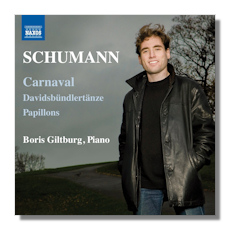
The Internet's Premier Classical Music Source
Related Links
- Schumann Reviews
- Latest Reviews
- More Reviews
-
By Composer
-
Collections
DVD & Blu-ray
Books
Concert Reviews
Articles/Interviews
Software
Audio
Search Amazon
Recommended Links
Site News
 CD Review
CD Review
Robert Schumann

Piano Works
- Davidsbündlertänze, Op. 6
- Papillons, Op. 2
- Carnaval, Op. 9
Boris Giltburg, piano
Naxos 8.573399 77:11
Robert Schumann's early piano works are said by many to be among his most inventive and greatest masterpieces. Well, these are early works all, and each is a substantial collection of short pieces, arguably the composer's meat and potatoes in keyboard music. Here the pianist is the 2013 Queen Elizabeth Competition winner, Boris Gilburg, whose disc of the Prokofiev "War Sonatas" I reviewed here very favorably in 2012 (Orchid ORC100023). He has also recorded works by Rachmaninov, Liszt and Grieg, and generally to broad acclaim. In 2014 Giltburg signed an exclusive recording contract with Naxos, and this is his first CD for the label, with an all Beethoven disc to follow shortly.
The album begins auspiciously, as Giltburg is mostly on target in each piece in Davidsbündlertänze: he catches the sunny mood of the first item Lebhaft (#1), the wistful and intimate character of Innig (#2), the impatience of Sehr rasch (#6), the playful and quirky manner of Mit Humor (#12), and the tender songfulness of Zart und singend (#14), all with well judged dynamics, subtle accenting and slight tempo manipulations. His playing throughout the set is consistently subtle and fully in sympathy with Schumann's highly individual style. The shortest and arguably least substantial collection on the disc, Papillons, comes next. Giltburg manages to convey much the same range of color and a similarly deft sense for capturing the emotional thrust of each piece.
The biggest challenge comes, of course, with the most popular and important set here, Carnaval. Giltburg turns in a satisfying performance, to be sure, but one that will generate some controversy: his playing sometimes sounds a bit tame or suave, as with the opening of Preambule, and in both Chiarina and Promenade. Also, one notices a slight air of restraint in such pieces as with Valse noble, Reconnaissance, and the closing Marche des 'Davidsbündlertänze' contre des Philistins. Yes, Giltburg always plays with taste and subtlety, even in these pieces. Indeed, after the opening of Preambule, Giltburg's phrasing and imaginative voicing are utterly convincing, sounding like no other performance or recording in memory. Reconnaissance too, is so elegant and deftly phrased that one has to admire the interpretation even if it seems to come across as a bit reticent. Actually, Giltburg plays most pieces with great sensitivity and astonishing technical skill, like the restless Pierrot, the chipper and elegant Arlequin, the lovely Chopin, the mostly frenetic Pantalon et Columbine, and the brilliant Paganini. In the end though, a tad more tension and heft might have heightened the sense of drama and italicized Schumann's highly variable moods and unpredictable mood swings. Still, this is a fine, if slightly refined Carnaval, an account that is quite individual and always thoughtful.
In 2014 I reviewed the generally straightforward but very convincing Carnaval by Jon Nakamatsu (Harmonia Mundi HMU907503), and way back in 2000 I provided a notice for the very good, if slightly flawed effort by Ruth Slenczynska (Ivory Classics 71004). Giltburg compares favorably with these two, and might well be the preferred choice among listeners favoring a distinctive and thoughtful approach to this work. As for his Davidsbündlertänze and Papillons Giltburg turns in performances that can rank with the better, maybe even best versions. The pianist provides enlightening album notes and Naxos offers excellent sound reproduction. This is an auspicious start for Giltburg on his new label.
Copyright © 2015, Robert Cummings





















